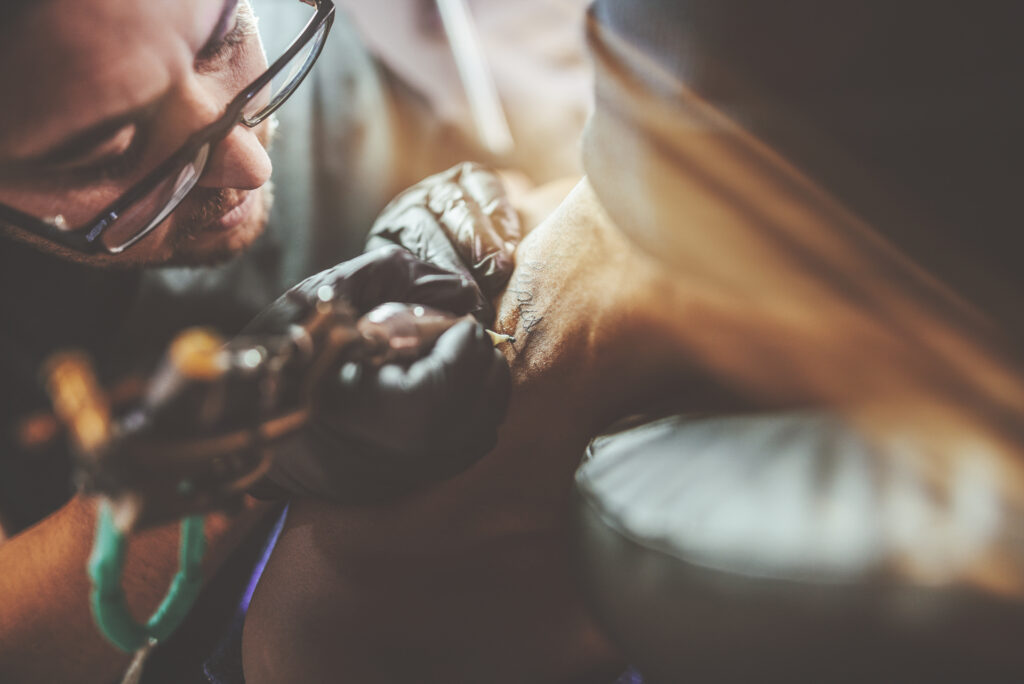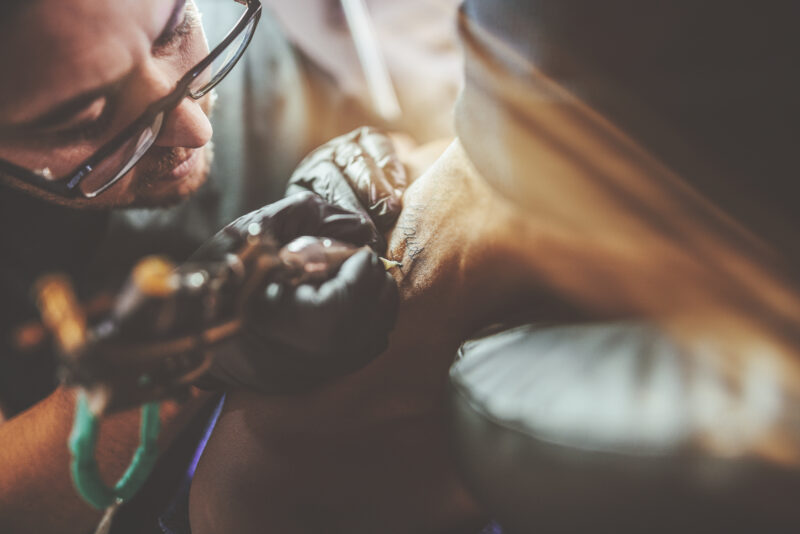As detailed in Part I of this blog post, despite the fact that Canadian courts have not yet grappled with a case related to copyright and tattoos, the Copyright Act and foreign caselaw suggests that copyright very likely subsists in tattoos and that the rights to tattoos most likely reside with the tattoo artists who design and ink the tattoos on individuals’ skin. This copyright can create a host of legal problems for tattooed individuals, particularly public figures whose tattoos could end up on display and recreated across many different platforms. Continue reading for a discussion of some of the options available to those individuals who are concerned about the consequences of not owning their own tattooed image.
What is the solution to avoiding infringing copyright in tattoos?
The primary solution to avoiding any sort of legal trouble relating to tattoos is for public figures to acquire, by either assignment or licence, the right to include the tattoos when their image is recreated digitally or to reproduce and display their tattoo in any other form.
A copyright assignment transfers the ownership and the rights associated with ownership to the assignee. A licence grants the licensee the right to use the work for a specified purpose during the term of the licence. Typically, a licence is less expensive and less difficult to obtain because it allows the original creator to retain ownership. Pursuing a non-exclusive licence to reproduce and display the tattoo in any medium and in any manner would be a good option for high-profile individuals such as athletes and actors to consider before committing to a tattoo.
If a company or individual wishes to recreate a tattoo, or the image of a person with tattoos, and the person who possesses the tattoo has not yet negotiated an agreement with their tattooist, the company should consider negotiating their own licensing agreement with the tattooist before recreating the work and potentially incurring a lawsuit.
Additional Considerations
It should be noted that in Canada, moral rights cannot be assigned, they can only be explicitly waived. Whether the agreement is for an assignment of copyright or a licensing arrangement, the tattooed individual or company seeking to use the individual’s tattoo should ensure that the tattooist has waived their moral rights as part of any agreement they negotiate. Otherwise, the tattoo artist might claim infringement if a public figure associates the tattoo with any venture that the tattooist deems to be offensive.
It is also worth noting that even if someone collaborates with their tattooist in designing their tattoo, they will still run into issues if someone else seeks to recreate the tattoo to which the tattooed individual and tattooist are co-owners. Co-owners of copyright are able to assign their interest or ownership in their jointly owned work without the consent of the other co-owner. However, co-owners are unable to license their jointly owned work without the consent of the other co-owner. Seeing as most people would probably prefer not to assign their interest in their own tattoos to a company who would then permanently own the rights to part of their image, public figures will still have to negotiate assignment or licensing agreements with their tattooists in order to allow unaffiliated parties to commercialize their image even if they are co-owners of their tattoo.
Takeaways
The fact that tattoos are most likely copyrightable works raises many potential legal issues that have not yet been decided by the courts. While it seems unlikely that a tattoo artist would win if they were to claim infringement due to a photograph or video being taken of the individual openly sporting their original tattoo unless it were for a commercial venture, it seems a lot less likely that legal claims could be entirely avoided if an individual or company were to recreate the tattoo in either a photograph, video, or digital format.
The solution to avoiding any potential copyright infringement in relation to tattoos is for tattooed public figures and individuals or companies seeking to recreate original tattoos to look into negotiating an assignment or a licence from the tattoo artists.

PARTIE II : Les tatouages sont-ils protégés par le droit d’auteur?
Comme nous l’avons mentionné dans la première partie de ce billet et malgré le fait que les tribunaux canadiens n’aient pas encore été saisis d’une affaire liée au droit d’auteur et aux tatouages, la Loi sur le droit d’auteur et la jurisprudence étrangère laissent entendre que le droit d’auteur subsiste très probablement dans les tatouages, et que les droits liés aux tatouages appartiennent très probablement aux tatoueurs qui conçoivent et dessinent les tatouages à l’encre sur la peau des individus. Ce droit d’auteur pourrait créer toute une série de problèmes juridiques aux individus tatoués, en particulier les personnalités publiques dont les tatouages pourraient être exposés et reproduits sur de nombreuses plateformes différentes. Poursuivez votre lecture pour découvrir certaines des options offertes aux personnes qui ne sont pas propriétaires de leur propre image tatouée et qui s’inquiètent des conséquences pouvant en découler.
Quelle est la solution pour éviter d’enfreindre le droit d’auteur lié aux tatouages?
La principale solution pour éviter tout problème juridique lié aux tatouages serait, pour les personnalités publiques, d’acquérir par cession ou par licence le droit d’inclure les tatouages qu’ils portent à leur image, lorsque celle-ci est reproduite numériquement, ou que leurs tatouages soient reproduits ou affichés sous toute autre forme.
Une cession de droit d’auteur transfère la propriété et les droits associés à la propriété au cessionnaire. Une licence accorde au titulaire le droit d’utiliser l’œuvre à une fin déterminée pendant toute la durée de la licence. Habituellement, une licence est moins coûteuse et moins difficile à obtenir parce qu’elle permet au créateur original de conserver la propriété de l’œuvre. L’obtention d’une licence non exclusive permettant que le tatouage soit reproduit et affiché sur n’importe quel support et de n’importe quelle façon serait une solution à considérer pour les personnes très en vue, comme les athlètes et les acteurs, avant de se faire tatouer.
Si une entreprise ou un individu souhaite reproduire un tatouage ou l’image d’une personne portant des tatouages, et que cette personne n’a pas négocié un accord avec son tatoueur, l’entreprise devrait envisager de négocier son propre accord de licence avec le tatoueur avant de reproduire l’œuvre. De cette façon, toute éventuelle action en justice sera évitée.
Autres considérations
Il convient de noter qu’au Canada, les droits moraux ne peuvent pas être cédés, mais seulement faire l’objet d’une renonciation explicite. Que l’entente porte sur la cession d’un droit d’auteur ou sur un accord de licence, la personne tatouée ou l’entreprise qui cherche à utiliser le tatouage de la personne devrait s’assurer que le tatoueur a renoncé à ses droits moraux dans le cadre de toute entente qu’elle négocie. Sinon, le tatoueur pourrait alléguer une violation de ses droits si une personnalité publique associe le tatouage à une activité que le tatoueur juge offensante.
Il convient également de noter que même si quelqu’un collabore avec son tatoueur lors de la conception de son tatouage, il se heurtera toujours à des problèmes si quelqu’un d’autre cherche à reproduire le tatouage duquel l’individu tatoué et le tatoueur sont copropriétaires. Les copropriétaires de droits d’auteur peuvent céder les intérêts ou la propriété de leur œuvre commune sans le consentement de l’autre copropriétaire. Toutefois, les copropriétaires ne peuvent pas concéder de licence pour leur travail en copropriété sans le consentement de l’autre copropriétaire. Puisque la plupart des gens préféreraient probablement ne pas céder leurs intérêts dans leurs propres tatouages à une entreprise qui détiendrait alors de manière permanente les droits relatifs à une partie de leur image, les personnalités publiques devraient toujours négocier des accords de cession ou de licence avec leurs tatoueurs. Elles permettraient ainsi que des parties non affiliées puissent commercialiser leur image même si elles sont copropriétaires de leurs tatouages.
Ce qu’il faut retenir
Les tatouages sont très probablement des œuvres protégées par le droit d’auteur et soulèvent de nombreuses questions juridiques potentielles qui n’ont pas encore été tranchées par les tribunaux. Il semble peu probable qu’un artiste tatoueur obtienne gain de cause s’il allègue une violation de ses droits en raison d’une photographie ou d’une vidéo arborant ouvertement un individu portant son tatouage d’origine, à moins qu’il ne s’agisse d’une entreprise commerciale. Par contre, il semble encore moins probable d’éviter complètement les poursuites judiciaires si une personne ou une entreprise devait reproduire le tatouage en format photographique, vidéo ou numérique. La solution pour éviter toute violation potentielle du droit d’auteur en ce qui concerne les tatouages est que les personnalités publiques qui sont tatouées, et les individus ou les entreprises qui cherchent à reproduire des tatouages originaux parviennent à négocier une cession ou une licence auprès des artistes tatoueurs.
Kiera Boyd practices in the area of communications, with a particular emphasis on copyright.
Kiera graduated from the Faculty of Law at the University of Western Ontario. Prior to law school, she completed an Honours Bachelor of Arts in English Literature with a minor in Political Science at Queen’s University. During her summers throughout school, Kiera worked as an Administrative Assistant at a large national firm, where she was part of the Intellectual Property Team.


